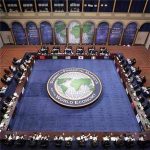 Occupy Wall Street and cognate groups around the world are part of a protest movement that is both global and local. It is global in terms of geographic scope, thematic range, and social composition. It is local in terms of the specific objects of protest and the protesters’ goals. The organic blending of the global with the local is reflected in the very unfolding of this worldwide wave. As the Egyptian activist Asmaa Mahfouz has remarked, the various groups “work in symbiosis, learning from and imitating each others’ strategies . . . the call for Occupy protests came from Canada, the General Assembly structures came from Spain, and the outcry of ‘We are the 99%’ came from Italy. Many occupiers took inspiration from our Tahrir Square; now the Occupy movement across the United States is inspiring us in Egypt.”1
Occupy Wall Street and cognate groups around the world are part of a protest movement that is both global and local. It is global in terms of geographic scope, thematic range, and social composition. It is local in terms of the specific objects of protest and the protesters’ goals. The organic blending of the global with the local is reflected in the very unfolding of this worldwide wave. As the Egyptian activist Asmaa Mahfouz has remarked, the various groups “work in symbiosis, learning from and imitating each others’ strategies . . . the call for Occupy protests came from Canada, the General Assembly structures came from Spain, and the outcry of ‘We are the 99%’ came from Italy. Many occupiers took inspiration from our Tahrir Square; now the Occupy movement across the United States is inspiring us in Egypt.”1
The movement’s “glocal dynamic”—to coin an ugly phrase—is also visible in the protesters’ response to the violent crackdown that has already been unleashed in Cairo, New York City, and elsewhere.2 Just as Occupy Wall Street has triggered similar protests across the United States and encouraged the protagonists of the Arab Spring to continue their largely peaceful uprising, so too the brutal eviction is fueling the worldwide Occupy movement and strengthening the resolve of its local participants on Tahrir Square and the steps of St. Paul’s Cathedral in London. Of course the global crackdown varies locally in nature, scope, and intensity; yet at the same time, it suggests that both nascent and mature democracies are compatible with police states that suspend core constitutional provisions and fundamental civil liberties.
The fusion of the global with the local is equally evident in relation to the specific objects of protest and the goals of the individual Occupiers. On the one hand, those activists who had previously been involved in international campaigns have recognized the need to engage with the concerns of the local community on whose territory they are now encamped. But on the other hand, as participants in a global protest movement, the Occupiers cannot be concerned with local issues alone. Protests, in order to be effective, must have a specific local object that nevertheless has global resonance: Tahrir Square exemplifies resistance against political oppression; los Indignados (the outraged) in Madrid and the demonstrators in Athens have mobilized against the austerity policy of debt-deflation; Occupy Wall Street and the St. Paul’s camp express a deep-seated anger about the impact of global finance on the local, real economy, which is shared by ordinary people and certain elites alike.
Civic Anatomy
I shall return to the interlocking of national states and transnational markets presently. For now, two brief points need to be made about the nature of the current glocal protest movement. First of all, the differences with the movements that emerged in recent decades are striking. In the past, virtually all movements either appealed to specific communities—workers, women, students, minorities—or crystallized around specific issues, like anti-colonialism, third-world poverty, globalization, and climate change. By contrast, the protest movement now views itself as the broadest possible community of resistance and transformation—a vision that is encapsulated in slogans like “We are the 99%” and “Whose streets? Our streets.” The Occupy movement is an expression of popular outrage and mobilization that is not beholden to certain anarchist or communist extremes that dominated many anti-globalization movements in the late 1990s and early 2000s. Nor is today’s popular protest connected with any established political forces that can co-opt and manipulate it. As such, the worldwide wave transcends single-issue campaigns, social movements, and political protest in the direction of a civic community that seeks to (re-)establish the priority of the social over the economic and the political by (re-)embedding states and markets in the civic bonds and interpersonal relationships of civil society.
Linked to the primacy of shared “civicness”3 is an interesting development beyond the categories and practices of postmodern pluralism. The latter either absolutizes difference (however spelt), which leads to conflict that can only be regulated by power, or else it strives to convert the “other” into the “same” through ahistorical, supposedly universal but in reality narrowly Western secular categories such as values of “liberation” and “emancipation” linked to the political left or values of “freedom of choice” and “opportunity” associated with the political right. In a strikingly different configuration, the glocal protest movement neither sacralizes otherness nor erects absolute divisions. Rather, it attempts to break down the barriers that shield the governing elites from democratic accountability by pursuing a politics of the common good in which all citizens can share. As such, the glocal protest movement seeks to reassert broad civic control over the economy and politics, democratize both states and markets, and reintroduce popular participation into political representation. Thus, we are seeing the resurgence of the civic that blends individual and group rights with mutual help and reciprocal responsibility.
The London protesters are a good example of this. Once their attempt to occupy the London Stock Exchange failed, they set up camp outside neighboring St. Paul’s Cathedral. The City of London Corporation, which owns the occupied land, served an eviction notice on the encampment—with the connivance and approval of some cathedral staff, who had closed St. Paul’s on health and safety grounds and wanted the camp removed. That prompted the chancellor of St. Paul’s, the Reverend Giles Fraser, to resign in protest against the church’s apparent support of bankers and the police against the Occupy movement.
At first, anger among the Occupiers and beyond focused on the cathedral staff and the bishop of London—whose closure of St. Paul’s and complaint about lost revenue from tourist visitors betrayed the church’s vocation to serve all the people of London and pursue the city’s good. As popular outrage spread from the protesters to many of Britain’s usually quiescent elites, the cathedral dean stepped down and Bishop Richard voiced his qualified support for the Occupy movement. Meanwhile the City of London Corporation briefly suspended its legal action before serving once more an eviction notice.
In response, the protesters have turned their attention to the status of the Corporation, which in its locality is uniquely independent of national law and regulation but has used its privilege to serve the interest of global finance. This represents “a perversion of properly medieval participatory and guild arrangements originally designed to subordinate commercial to social purposes”4 that is the result of central government removing limits on capital mobility and enhancing the power of multinational corporations over their local self-government. That is why the Occupy movement’s call for proper civic control over London’s economic governance represents a local object of protest that can make an immense global difference.
Resistance against Big Business and Big Government
The constitutionally unconstrained rule of London’s City over the city of London and the rest of the country—aided and abetted by successive British governments since Margaret Thatcher—points to the interlocking of national states and transnational markets that characterizes the dominant model of globalization since the late nineteenth century.5 Worldwide there is an implicit, inchoate sense that big business and big government have colluded at the expense of the people. Both central states and free markets are increasingly disembedded from society, and society is progressively subjugated by the global “market-state.” For example, through local vassals like the City of London Corporation, the market-state subordinates social to commercial purpose. More fundamentally, global finance is disconnected from ethical and social goals. Likewise, governments of the left and the right have either replaced mutualist arrangements among workers with centralized, bureaucratic welfare or outsourced the delivery of public goods to private service providers—or indeed both at once. That is why protesters have denounced not just the banks but also the regulators and the executive branch of government, which have all been complicit in the credit-fueled, debt-financed consumption spree on which the “new economy” was built.
The collusion of big government and big business has brought about a system that privatizes profit, nationalizes losses, and socializes risk. In turn, this has exacerbated already existing income and asset inequality and also reinforced poverty in developed countries and emerging markets. Linked to this are, first, a centralization of power and, second, a concentration of wealth that are more reminiscent of pre-revolutionary France than the post-1945 settlement. From its outset, the global economic turmoil of 2008–2009, with its devastating social consequences, was merely a symptom of a much larger political and moral crisis.
So far, the expressions of anger are as diverse as the demonstrators’ demands are vague. But recent weeks have seen a remarkable effort by very different groups to agree on both general principles and concrete policy proposals. Given the local context in which the staff of St. Paul’s Cathedral initially sided with the City of London Corporation and the police against the protesters (before eventually backing down in the face of resistance from courageous clerics, the laity, and the wider public), the call by the Archbishop of Canterbury Rowan Williams for a public debate on specific action has global significance.6 In symbolic and real terms, the parish remains the most primary unit of social and civic life that connects people across cities and countries and even beyond national borders. As such, the church really does embody the “free space” between the “sovereign ruler” and the “sovereign people” on which the autonomy of civil society ultimately rests.
In London and elsewhere, faith groups—together with nonreligious, civic associations—are uniquely positioned to contribute to such public debates and translate new ideas into transformative action. Indeed, religious communities provide a space where righteous wrath can be channeled and directed toward concrete campaigns, as demonstrated by the work of London Citizens (recently expanded and renamed as Citizens UK, with local branches in other cities and regions of Britain), a civic organization that brings together about 150 local communities, associations, and different faith groups under the umbrella of Christian social teaching and the tradition of community organizing pioneered by Saul Alinsky.7 In London and elsewhere, it has successfully campaigned for the introduction of the “living wage” (higher than the minimum wage) in both the public and the private sector, voluntary caps on interest rates (for example, on credit cards and shop cards), and a more hospitable treatment of migrant workers and asylum-seekers, led by community-based groups instead of public authorities or private companies.
Such and similar action connects protest movements like the Occupiers outside St. Paul’s to existing grassroots movements and civic associations. There are growing contacts between the Occupy movement and Citizens UK, as evinced by a recent initiative, entitled “Ethical Economics and Moral Markets,” that will provide reading resources and campaign ideas for a national network of parishes, mosques, synagogues, and nonreligious communities. In this manner, religious and secular groups cooperate and link growing popular discontent to fundamental moral questions that demand fresh answers. Neither state laws nor business regulations can by themselves instill the virtuous behavior—integrity, honesty, mutual trust, reciprocal respect—on which a good society and a good economy depend. Local communities and global networks—both religious and secular—provide the civic embeddedness that states, markets, and the so-called third sector require.
Crucially, religions also remind us all that global capitalism is ultimately a heresy. The problem is not so much that the high priests of global finance preach a new creed, which worships false idols. Rather, the capitalist economy redefines the sacred in ways that destroy the sanctity of life and land, as Karl Polanyi first argued.8 By sundering material objects from moral meaning and symbolic significance, disembedded capital de-sacralizes the shared reality we all inhabit and reduces everything to tradable commodities. And by separating financial from ethical value and measuring all things according to nominal monetary worth, global finance grants abstract money quasi-sacred status. In short, capitalism profanes the sacred and sacralizes the profane—a modern radicalization of the moneylenders who desecrated the temple. In part, this explains why the glocal protest movement is concerned not just with purely material or technical issues but also (and perhaps more so than previous protests) with symbolic resonance.
Beyond the Religious-Secular Divide
Against capitalist commodification, religious and nonreligious groups are increasingly united in their efforts to re-embed the economy in society. For example, Ken Costa, an influential Christian banker who has funded the Alpha course, an introduction to the basics of Christian faith, has urged bankers and financiers to heed the call of protesters and eschew short-term profit maximization in favor of long-term sustainable investment with a social purpose.9 He now spearheads the new St. Paul’s initiative on how to reconnect finance with ethics. Of course, neither this nor any other similar initiative by an establishment figure is likely to lead to genuine transformation. But it is surely a sign of our time that secular and non-secular critiques of capitalism are converging and producing shared ideas.
This also confirms that we have entered a “post-secular” phase, where religious and other ideological bodies should be able to express themselves directly in their own terms within the public square.10 However, for Jürgen Habermas, the norms to regulate this debate must remain secular and liberal (procedural and majoritarian). For Joseph Ratzinger, by contrast, there must be a plural search for a shared common good. In the pope’s case, a reinvention of constitutional corporatism in a more pluralist guise against modern liberalism is linked to an insistence both on the fundamental relationality of all beings and on the indelible role of basic social units above the level of the individual. That reflects the growing focus on groups, associations, and all the intermediary institutions of civil society that—taken together—constitute the civic realm, which is more primary than either the economic or the social. So configured, the civic resists the redefinition of the sacred by the secular forces of the global market-state. Moreover, beyond the old divide of exclusively sectarian or purely secular accounts, religious and nonreligious groups alike link the moral foundations of the market to notions of the sacred and the practice of virtue. Far from being utopian, such a perspective combines strict ethical and civic limits on the power of market-states with the pursuit of the common good in which all can share.
The nascent global cooperation between local protest groups is producing a number of general movement objectives and concrete policy proposals. First of all, against taxpayer bailouts of corporate banks, the Occupy movement, Citizens UK, and other civic groups are calling for the demonopolization of banking and finance and other sectors that are dominated by oligopolistic or monopolistic arrangements. They are also campaigning for the relocalization of global finance, which is increasingly abstracted from the real economy but at the same time pervades all areas of economic activity and ties them to the volatility of worldwide capital. Once again, focusing on a local object of protest can make a significant global difference. Indeed, the international campaign for the separation of casino-style from retail banking and greater investment in more locally owned, mutual banking—based on existing building societies and credit unions—is gathering pace.
Second, the local protest outside St. Paul’s has provided renewed impetus to the global campaign for the introduction of a financial transaction tax, or “Robin Hood tax,” which Archbishop Rowan and other senior clergy and religious leaders also endorse. This measure has been advocated for some time by civil-society campaigners and was promoted by a thousand economists from fifty-three countries in a letter addressed to the G-20 finance ministers at their April 2011 summit meeting in Washington, DC.11 While the current governments of France and Germany are in favor, the United States and the United Kingdom are opposed to the Robin Hood tax as long as it is not adopted globally. But even the International Monetary Fund, in a study published earlier this year, shows how it can be applied unilaterally.12 In fact, this is already the case for various kinds of stamp taxes levied on the value of shares owned by investors. For example, the United Kingdom charges 0.005% on the value of shares owned and listed on the London Stock Exchange—precisely where the St. Paul protesters are encamped. To break the political deadlock, a tax could be levied on a trial basis on foreign currency exchange, which amounts to US$4 trillion per day, before it is extended to other financial transactions. Broad religious support for such and similar initiatives can exert real pressure and leverage. For example, the Jubilee campaign in 2000 helped bring about third-world debt forgiveness, and subsequent initiatives have seen ecumenical efforts to “Make Poverty History.”
Third, both the Occupiers at St. Paul’s and Citizens UK call for the abolition of the legal and political walls that separate global financial districts like Wall Street and the City of London from their respective metropolis. That separation has led to the progressive disembedding of the economy from society and the perverse re-embedding of the social in the economic. As a result, the commercial purpose of short-term maximization trumps the social purpose of long-term investment and shared prosperity, and corporate finance is disconnected from public ethics. Linked to this is the imperative to subject financial services and the whole of corporate governance to democratic accountability, as Maurice Glasman has argued.13 These efforts at civic renewal are connected to the idea of fostering democratic participation so that all citizens have a say in the ways wealth is produced and distributed. Based on a renewed guild structure and a bicameral ruling institution, including a vocational chamber, businesses and other professional associations would also be given a voice in the governance of towns, cities, and metropolises.
The Transformative Potential of the Civic
All this points toward a new kind of settlement whereby both the centralized bureaucratic state and the unfettered global free-market are transformed in order to serve the genuine needs and interests of persons, communities, and the environment. More global coordination and local cooperation are required in order to address worldwide issues such as capital flows and climate change. Thus, the global protest movement and its manifold local expressions seem to provide a post-secular response to the secular heresy of global capitalism and its political sponsors. The contested space of the city—both local and global—appears to contain the germs of a vision for an alternative economy that reconnects the financial to the ethical and an alternative politics that reasserts the primacy of the civic over the economic and the social.
If this is the case, then it seems that the global protest movement has the potential to offer a new kind of ideology that transcends the old binary relations that have characterized modern politics. By linking universal principles to particular, transformative practices, the global protest movement and the myriad of local civic initiatives might even politicize the wider population and help foster new virtuous elites.
This essay is also being published by The Immanent Frame.—eds.
1. Asmaa Mahfouz, “From Tahrir Square to Liberty Plaza, the Occupation Continues,” Guardian, November 15, 2011,http://www.guardian.co.uk/commentisfree/cifamerica/2011/nov/15/from-tahrir-square-to-liberty-plaza.
2. Craig Calhoun, “Evicting the Public,” Possible Futures, November 19, 2011,http://www.possible-futures.org/2011/11/19/evicting-the-public-why-has-occupying-public-spaces-brought-such-heavy-handed-repression/.
3. On the concept of shared “civicness,” see Saskia Sassen, “The Global Street Comes to Wall Street,” Possible Futures, November 22, 2011, http://www.possible-futures.org/2011/11/22/the-global-street-comes-to-wall-street/.
4. John Milbank, “Anglican Church Spectacularly Blind to Protest Symbolism,” ABC Religion & Ethics, November 2, 2011, http://www.abc.net.au/religion/articles/2011/11/02/3354567.htm.
5. See Adrian Pabst, “The Crisis of Capitalist Democracy,” Telos 152 (Fall 2010): 44–67.
6. Rowan Williams, “Time for Us to Challenge the Idols of High Finance,” Financial Times, November 1, 2011, http://www.ft.com/cms/s/0/a561a4f6-0485-11e1-ac2a-00144feabdc0.html.
7. Austen Ivereigh, Faithful Citizens: A Practical Guide to Catholic Social Teaching and Community Organising (London: Darton, Longman & Todd, 2010).
8. Karl Polanyi, The Great Transformation: The Political and Economic Origins of Our Time(Boston, MA: Beacon Press, 1944).
9. Ken Costa, “Why the City Should Heed the Discordant Voices of St Paul’s,” Financial Times, October 28, 2011, http://www.ft.com/intl/cms/s/0/3cb2bf14-009b-11e1-ba33-00144feabdc0.html.
10. Jürgen Habermas and Joseph Ratzinger, Dialectics of Secularization: On Reason and Religion, trans. Brian McNeil (San Francisco, CA: Ignatius Press, 2007); originally published asDialektik der Säkularisierung: Über Vernunft und Religion (Freiburg: Herder, 2005).
11. Heather Stewart, “Robin Hood Tax: 1,000 Economists Urge G20 to Accept Tobin Tax,”Guardian, April 13, 2011, http://www.guardian.co.uk/business/2011/apr/13/robin-hood-tax-economists-letter.
12. Thornton Matheson, “Taxing Financial Transactions: Issues and Evidence,” IMF Working Paper WP/11/54, International Monetary Fund, March 2011,http://www.imf.org/external/pubs/ft/wp/2011/wp1154.pdf.
13. Maurice Glasman, “How the St Paul’s Protesters Seek to Democratise London,” Guardian, October 28, 2011, http://www.guardian.co.uk/commentisfree/2011/oct/28/st-pauls-protesters-democratise-london.
source: possible-futures.org












Adauga comentariu